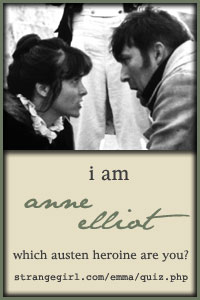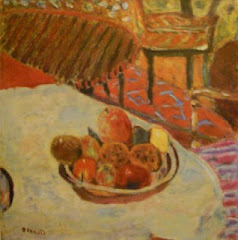Friday, September 25, 2015
Friday Calm: The Omelette and the Frog
Despite the noises of a house being torn down this morning in the hills behind, all calm is possible. I'll lose myself in writing and in books.
I am reminded somehow of the simple omelette eaten by the wistful visitor to Paris in The Ambassadors by Henry James—the possibility of being transported quite elsewhere by a small detail, a quiet line, the sound of water and the frog in Basho's famous haiku.
image: Christie B. Cochrell, Bench
Tuesday, September 22, 2015
Lingering
It is the time of
year when things linger . . .
among them,
. the lingering
fragrance of bergamot in the Earl Grey tin;
. the lingering
burn of green chili on the skin of my hands, after (lingeringly) seeding and
peeling the half bushel I had roasted on Sunday—another of the best smells in
the world.
It's time to slow
down, to appreciate every last drop of things.
I've pulled out my worn old t-shirt from the Thoreau Sauntering Society,
pronouncing "It's a great art to saunter." Lingering and sauntering are much the same,
the art of painstaking, of woolgathering too, of noting what is here, today, the
last day of summer, and might not be here tomorrow or the day after, so should
be paid close attention to. (Don't end
sentences with prepositions, unless you
want to. As my dear father used to say,
quoting I don't know who, "What did you bring the books I didn't want to
be read to out of up for?" Words,
too, are fun to linger in, saunter among.)
"To make
longer," the German word for linger meant.
And also "to long." I
love that, longing to make longer—that's what autumn's all about.
image: Christie B. Cochrell, Thendara Sky
Saturday, September 19, 2015
Friday, September 18, 2015
Places I Would Rather Be
Much rather in a lovely garden of sublime colors and misty grasses than fighting with the unemployment Web site . . .
image: Garden (from Garden Design by Carolyn Mullet)
Sunday, September 13, 2015
People I Have Been Before
I've
been coming back on people I have been before, and things I've loved and
somehow lost sight of—surprised and pleased to find them there, still waiting
for me, after all these years.
· the ocean, walking there,
watching seabirds, eating grilled fish on a terrace
· the baby pigs at Rancho San
Antonio, the hidden grotto on the river in the trees
· croquet
· little sailboats thrilled
with wind
· library books
· drawing with fine-tipped
pens
· turtles
· chalcedony and malechite
and quartz crystals
· Inspector Clouseau
· tiny overripe raspberries
· Jackson Browne
· coffee with milk
· Nabokov
· wasabi, wabi sabi,
zabaglione
· wordplay
· Marguerite Duras
· barbecued oysters
· Sempe
· The Owl and the Pussycat
image: Christie B. Cochrell, Window in Lucca
Friday, September 4, 2015
Boyd Cochrell
Happy birthday to
my favorite father, who would have been 95 years old today (and likely hating
every moment), and would certainly not have approved my buying those purple petunias I've set next to the St. Francis bird bath against
the back fence. When he died, my mother
bought purple pillows, in defiance, to assert her own preferences. And I, defiantly, came to love cello and
violin music, despite his scathing ridicule.
Much of that was
put on—he was one of the most tolerant of men, and loved life and his family and
friends. Some of his favorite things:
democrats
The New Yorker
Tanqueray martinis
The Mikado
Paris and Rouen
double crostics
huckleberry pie
dark chocolate
Beethoven's Emperor
Concerto
Dick Francis
mysteries
Norwegian lefse with
green chili instead of
white flour tortillas
white flour tortillas
Yellowstone
New York
dogpaddling
Strauss operas
sourdough pancakes
Yachats, Oregon
John Lee Hooker's I Ain't Got Nobody
huckleberry pie
again
image: Boyd Cochrell
Tuesday, September 1, 2015
The Poets at Their Windows
Monday
The birds are in their trees,
the toast is in the toaster,
and the poets are at their windows.
They are at their windows
in every section of the tangerine of
earth-
the Chinese poets looking up at the
moon,
the American poets gazing out
at the pink and blue ribbons of
sunrise.
The clerks are at their desks,
the miners are down in their mines,
and the poets are looking out their
windows
maybe with a cigarette, a cup of tea,
and maybe a flannel shirt or bathrobe
is involved.
The proofreaders are playing the
ping-pong
game of proofreading,
glancing back and forth from page to
page,
the chefs are dicing celery and
potatoes,
and the poets are at their windows
because it is their job for which
they are paid nothing every Friday
afternoon.
Which window it hardly seems to
matter
though many have a favorite,
for there is always something to see-
a bird grasping a thin branch,
the headlight of a taxi rounding a
corner,
those two boys in wool caps angling
across the street.
The fishermen bob in their boats,
the linemen climb their round poles,
the barbers wait by their mirrors and
chairs,
and the poets continue to stare
at the cracked birdbath or a limb
knocked down by the wind.
By now, it should go without saying
that what the oven is to the baker
and the berry-stained blouse to the
dry cleaner,
so the window is to the poet.
Just think-
before the invention of the window,
the poets would have had to put on a
jacket
and a winter hat to go outside
or remain indoors with only a wall to
stare at.
And when I say a wall,
I do not mean a wall with striped
wallpaper
and a sketch of a cow in a frame.
I mean a cold wall of fieldstones,
the wall of the medieval sonnet,
the original woman's heart of stone,
the stone caught in the throat of her
poet-lover.
—Billy Collins
(I, too, am at my window—out which, these days, there is a borrowed apricot orchard.)
image: Albert Marquet - Fenetre ouverte sur la baie. Seven Arts Friends
Subscribe to:
Posts (Atom)

























